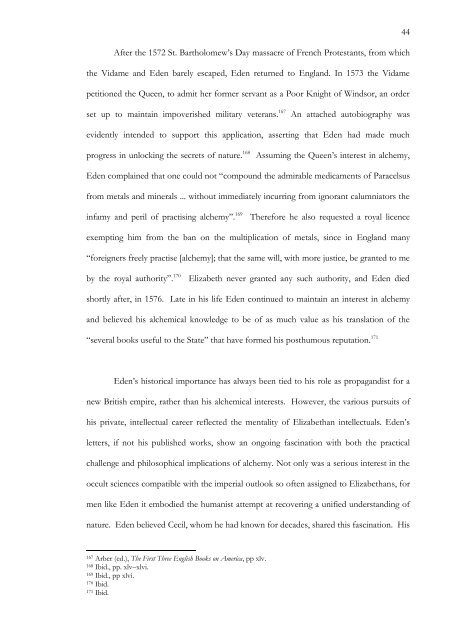The Alchemical Patronage of Sir William Cecil, Lord Burghley
The Alchemical Patronage of Sir William Cecil, Lord Burghley
The Alchemical Patronage of Sir William Cecil, Lord Burghley
Create successful ePaper yourself
Turn your PDF publications into a flip-book with our unique Google optimized e-Paper software.
After the 1572 St. Bartholomew‘s Day massacre <strong>of</strong> French Protestants, from which<br />
the Vidame and Eden barely escaped, Eden returned to England. In 1573 the Vidame<br />
petitioned the Queen, to admit her former servant as a Poor Knight <strong>of</strong> Windsor, an order<br />
set up to maintain impoverished military veterans. 167 An attached autobiography was<br />
evidently intended to support this application, asserting that Eden had made much<br />
progress in unlocking the secrets <strong>of</strong> nature. 168 Assuming the Queen‘s interest in alchemy,<br />
Eden complained that one could not ―compound the admirable medicaments <strong>of</strong> Paracelsus<br />
from metals and minerals ... without immediately incurring from ignorant calumniators the<br />
infamy and peril <strong>of</strong> practising alchemy‖. 169 <strong>The</strong>refore he also requested a royal licence<br />
exempting him from the ban on the multiplication <strong>of</strong> metals, since in England many<br />
―foreigners freely practise [alchemy]; that the same will, with more justice, be granted to me<br />
by the royal authority‖. 170 Elizabeth never granted any such authority, and Eden died<br />
shortly after, in 1576. Late in his life Eden continued to maintain an interest in alchemy<br />
and believed his alchemical knowledge to be <strong>of</strong> as much value as his translation <strong>of</strong> the<br />
―several books useful to the State‖ that have formed his posthumous reputation. 171<br />
Eden‘s historical importance has always been tied to his role as propagandist for a<br />
new British empire, rather than his alchemical interests. However, the various pursuits <strong>of</strong><br />
his private, intellectual career reflected the mentality <strong>of</strong> Elizabethan intellectuals. Eden‘s<br />
letters, if not his published works, show an ongoing fascination with both the practical<br />
challenge and philosophical implications <strong>of</strong> alchemy. Not only was a serious interest in the<br />
occult sciences compatible with the imperial outlook so <strong>of</strong>ten assigned to Elizabethans, for<br />
men like Eden it embodied the humanist attempt at recovering a unified understanding <strong>of</strong><br />
nature. Eden believed <strong>Cecil</strong>, whom he had known for decades, shared this fascination. His<br />
167 Arber (ed.), <strong>The</strong> First Three English Books on America, pp xlv.<br />
168 Ibid., pp. xlv–xlvi.<br />
169 Ibid., pp xlvi.<br />
170 Ibid.<br />
171 Ibid.<br />
44















